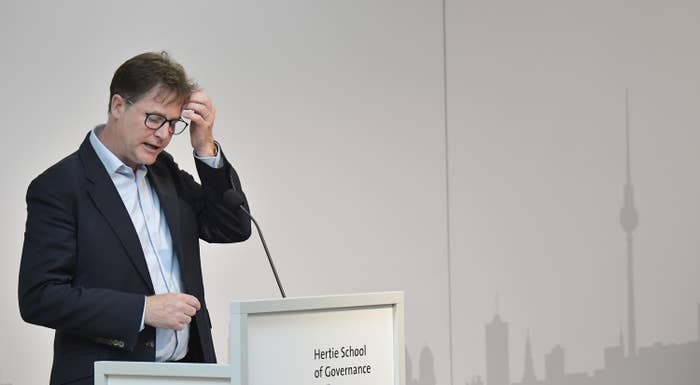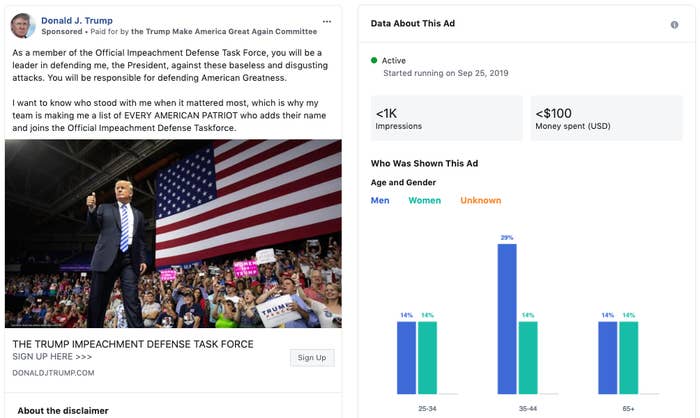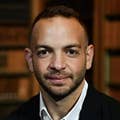
On Tuesday, as the country waited for House Speaker Nancy Pelosi to announce a formal impeachment investigation into President Donald Trump, Facebook’s vice president of global affairs and communications, Nick Clegg — the deputy prime minister of the United Kingdom from 2010 to 2015 — took to the stage at the Atlantic Festival in Washington, DC, to clarify how the platform handles elected officials: hands off.
In his remarks, Clegg said that Facebook will continue to exempt politicians from third-party fact-checking and allow them to post content that would otherwise be against community guidelines for normal users.
“I want to be really clear today — we do not submit speech by politicians to our independent fact-checkers, and we generally allow it on the platform even when it would otherwise breach our normal content rules,” Clegg said. “Of course, there are exceptions. Broadly speaking they are twofold: where speech endangers people and where we take money, which is why we have more stringent rules on advertising than we do for ordinary speech and rhetoric.”
The policy exempting politicians from fact-checking has been in practice since last year. As it’s written, it applies to politicians at the executive, national, and regional levels, including those running for office. It seems clearly designed to prevent Facebook from making content moderation decisions that put it at the heart of the presidential campaign in 2020 — and taking all kinds of heat from all sides for doing so. But, as the United States enters a historically tumultuous political moment, Clegg’s announcement caused as much confusion as it was designed to quell.
“I still don't really understand what the policy is and what implications it has for the campaigns that I work with,” Republican digital strategist Eric Wilson told BuzzFeed News. “It's just clear to me that they're lurching from crisis to crisis, and it doesn't seem like they have a firm grasp on getting this under control in time for 2020.”

A key concern among those contacted by BuzzFeed News was uncertainty over exactly whom the policy applied to. How would Facebook enforce its definition of a “politician"?
“This policy brings up more questions than it answers,” misinformation researcher Renee DiResta told BuzzFeed News. “The company needs to clarify what they mean by ‘politician.’ Is any edgelord who files papers to run for dogcatcher now a ‘politician,’ or is there some standard?”
A Facebook spokesperson declined to comment.
Chloe Colliver, a lead digital researcher at the Institute for Strategic Dialogue in London, told BuzzFeed News that exempting politicians from fact-checking Facebook opens up a hole in information integrity on the platform that President Trump could exploit during an impeachment fight.
“We have seen a wave of far-right politicians speedily rise into positions of influence within governments across Europe and the world, riding in part on the back of communications platforms that enable them to promote hateful and divisive content at a whole new scale, speed, and with intensive targeting capabilities,” Colliver said. “Facebook's third-party fact-checkers should be given the scope to fact-check all content equally, no matter the source of that content or claim.”
“Facebook is damned if they do damned if they don't, in this area, as in so many others.”
It isn’t just in the US that this wave has crested, but around the world. In the Philippines, Rodrigo Duterte weaponized rumors, fearmongering, and hate on the platform on his way to the presidency, as revealed by BuzzFeed News last year.
But for Facebook, a hands-off approach to politicians' speech has benefits, allowing it to sidestep a tug-of-war between political parties asking it to censor the other side.
“Facebook is damned if they do, damned if they don't, in this area, as in so many others,” Stanford Law Professor Nathaniel Persily told BuzzFeed News. “If they were to start broadly censoring the president of the United States, you can imagine what the moves would be to regulate them and break them up. We already saw it with Google, where the president accused them of trying to tilt search results. That's just the dangers that these companies face right now.”
On Wednesday, YouTube CEO Susan Wojcicki made a similar announcement at the Atlantic Festival, saying that YouTube would allow politicians to break community guidelines.
"When you have a political officer that is making information this is really important for their constituents to see, or for other global leaders to see, that is content that we would leave up because we think it's important for other people to see," Wojcicki said.
Adding to the confusion around Clegg’s speech is that he wasn’t actually outlining one policy, but two. In a muddled way, Clegg also detailed Facebook’s policy around “newsworthy" content, which applies to all users. If the site deemed something newsworthy, it will not be removed from the platform.
“To use tennis as an analogy, our job is to make sure the court is ready — the surface is flat, the lines painted, the net at the correct height,” Clegg said. “But we don’t pick up a racket and start playing. How the players play the game is up to them, not us.”
And as of Wednesday morning, President Trump’s official Facebook page was charging the net, writing in one post, “Democrats wrote to the Ukrainian government in May 2018 urging it to continue investigations into President Donald Trump’s alleged collusion with Russia in the 2016 presidential campaign — collusion later found NOT TO EXIST.”

